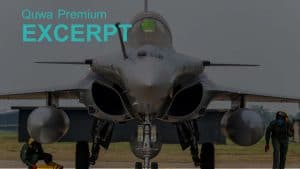In its latest ‘Two Years Performance Report,’ the Pakistani Ministry of Defence Production (MoDP) said that it drafted and circulated a new defence offset policy....
Quwa Premium Except
By Arslan Khan Arslan Khan is an aerospace engineering student and an analyst/observer of Pakistani defence issues. In July 2018, Pakistan inked a contract with...
On 27 August 2020, the Pakistan Air Force (PAF) announced that it inaugurated a ‘Centre of Artificial Intelligence & Computing’ (CENTAIC).
From new armoured vehicles to high-tech naval vessels, Pakistan’s major arms acquisitions from China are starting to take shape. Pakistan will induct a large assortment...
Pakistani industries and universities advertise deep & fruitful industry-academia linkages in their promotional materials. However, one struggles to see the fruits of these so-called linkages...
On 28 July 2020, the Pakistan Army’s Inter Services Public Relations (ISPR) announced that Heavy Industries Taxila (HIT) delivered a batch of al-Khalid-I main battle...
On 30 July 2020, the Indian Air Force (IAF) received the first five of 36 Dassault Rafale multi-role combat aircraft from Dassault. The aircraft were...
Pakistan’s frigate and corvette acquisition/upgrade programs will deliver a considerably more capable force by the middle of the coming decade, but there may still be...
FGFAs, which are exponentially more complex, will face inevitable delays, so the PAF can decide to “cut its losses” by killing the FGFA program and,...
With Russia’s United Engine Corporation (UEC) announcing that it started testing its RD-93MA turbofan engine, could the new powerplant make its way to the JF-17?









